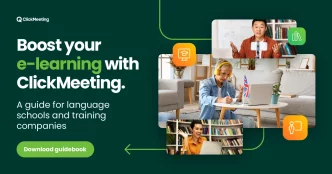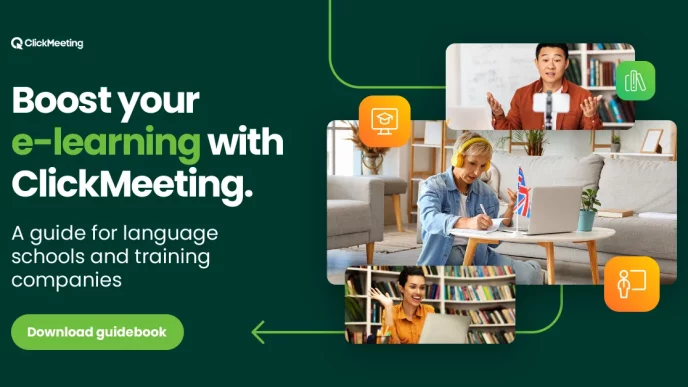Are you planning an event? If so, you might be wondering what kind of content to include.
Keynote speeches, hands-on workshops, and an exhibition gallery are all viable content types. But don’t forget about panel discussions, too.
In this article, we’ll explain what panel discussions are, whether you should host one or not, how to live stream your panel discussion to a virtual audience, and seven tips to make sure your panel discussion is educational and fun—for both your audience and your panelists.
We have a lot of valuable information to share, so let’s get started!
Table of Contents
What is a Panel Discussion?
Let’s start with a definition…
A panel discussion is a conversation between multiple people, called panelists, in which ideas are shared and questions are answered—all in front of a live audience.
These conversations are often facilitated by a moderator, whose job is to ask panelists questions, keep conversations on point, and in some cases, generate audience participation.
Panelists are typically experts in their respective fields, though this isn’t a requirement. The best panels feature a range of participants with distinct views. As long as conversations remain civil, a mix of opinions usually leads to the most stimulating conversations.
One final point: panel discussions can be held in-person or via the internet. If you do host a virtual panel discussion via the world wide web, just know that you’ll have to invest in the right software. We’ll talk more about this in a later section of this article.
Should You Host a Panel Discussion?
You’ll have to answer that question for yourself. What we can say is that panel discussions have a range of benefits. Here are three reasons you might want to host one:
Audience Participation
If you’ve hosted an event before, you know that audience engagement is crucial. If you can’t engage attendees in your material, your event won’t be very successful.
Panel discussions that allow audience members to ask questions are naturally more engaging than keynote speeches in which one person speaks and everybody else just listens. Because of this, panel discussions are a great way to generate audience participation.
Multiple Viewpoints
Panel discussions expose audience members to a variety of viewpoints, too.
Again, event attendees won’t have to listen to one person share one set of ideas. They’ll be able to listen to multiple people, each sharing their unique perspective on the topic at hand. Because of this, your audience may find panel discussions to be more worthwhile.
General Enjoyment
Finally, panel discussions are often more fun to attend than other kinds of events
Why? Because audience members can participate and interact with panelists, while panelists can build off each other’s points, argue, and otherwise interact with each other.
This dynamic turns standard speeches into conversations, which are oftentimes more entertaining, engaging, and useful for the people who watch and participate in them.
How to Live Stream Your Panel Discussion
Looking to live stream your panel discussion?
Maybe you’re hosting an event in your home town, but a portion of your audience is unable to attend in-person. Maybe your entire event is virtual and live streaming is the only way to share content with your audience. Either way, you need to know how to live stream effectively.
The key to an effective live stream is the right software. We suggest ClickMeeting.
With ClickMeeting, you’ll be able to broadcast your panel discussion to your entire audience, whether that audience is 10 people or 10,000 people strong.
While broadcasting, you and your panelists will have access to a wealth of features including custom branding, screen sharing and digital whiteboards, moderated chat, the ability to send polls and surveys, the ability to stream your conversation on social media, and recording features.
One of the best parts about ClickMeeting is the price tag. Try it for free for 14 days. If you enjoy using the tool, continue using it for as little as $25 a month.
7 Tips to Improve Your Panel Discussions Today
Ready to host a top-level panel discussion? Don’t worry, it’s not as hard as it sounds. Just implement these seven tips and your next panel discussion will go off without a hitch.
1. Choose an Interesting Topic
It doesn’t matter how amazing your moderator is, or how experienced your panelists are; if you don’t choose an interesting topic for your panel discussion, it won’t be successful.
The question is, how do you choose a stellar topic? Here are a few suggestions:
- Know Your Audience: What do your event attendees want to hear your panelists talk about? Pick a topic that will interest them, even if it doesn’t interest you.
- Choose Something Buzzworthy: The topic you choose should generate a bit of buzz in your industry. That way your panel discussion stays on the cutting edge.
- Get Specific: General topics aren’t a good first for panel discussions. Pick something more specific so that your conversation doesn’t veer too far off track.
2. Select an Experienced Moderator
Have you chosen a topic for your panel discussion? Now you need to select someone to moderate the conversation. If possible, choose someone with experience in this area.
Why? Because the moderator’s job is critical. They’re the ones who facilitate the discussion, keep it on track, and remind everyone (panelists and audience members) of “house rules.” In fact, choosing the wrong moderator will likely result in chaos.
Select a moderator who has leadership experience, confidence, and a likable personality. If they have knowledge of the chosen topic, great. But this shouldn’t be a requirement. The aforementioned traits (experience, confidence, and likeability) are much more important.
3. Partner With Awesome Panelists
You can’t host a stellar panel discussion without awesome panelists. That would be like trying to cook a restaurant quality meal with expired ingredients. It’s not going to work.
The best panel discussions feature three to five panelists. Each panelist should be an expert in their field. That way they can share valuable insights with your audience. In addition, choose panelists that hold different views to help stimulate conversation and debate.
Lastly, make sure the panelists you partner with have charisma and know how to work an audience. This will make the conversations they take part in more entertaining.
4. Pick an Appropriate Discussion Format
Next, pick a discussion format. There are plenty to choose from:
- Q&A: This format features a brief introductory discussion between panelists, followed by questions. Said questions are often asked by the event’s moderator. But in certain situations, audience members can ask questions, too. The panelists then take turns answering the questions they’ve been asked, sharing their insights.
- Debate: This format is best when talking about divisive and/or controversial subjects. Panelsist usually begin by stating their points of view. Then the moderator asks questions, the panelists answer them as they see fit, and a debate ensues. Live polling can be used during this kind of panel discussion to decide who wins the debate.
- Informal: This format, sometimes referred to as a fireside chat, features elements of the Q&A format above, but is hosted in a more informal manner. The goal isn’t to pit panelists against each other, but rather establish a sense of intimacy that leads to deep insights. Informal panel discussions are best for less contentious conversations.
The panel discussion format you choose will depend on your audience, topic of conversation, and the individual panelists you partner with. Choose a format that satisfies all three.
5. Prepare For the Live Conversation
As with any other kind of event, preparation is key.
Make sure your moderator knows about the topic your panelists will discuss. That way they can ask better questions and steer the conversation in the right direction.
If possible set aside time for your moderator and panelists to meet and get to know each other. The more chemistry they have, the better their discussion is likely to be.
And finally, prep a series of questions and share them with all participants. This will help your moderator plan their approach, and panelists to gather their thoughts and give more insightful answers. (Obviously, this tip doesn’t apply if you only plan to field audience questions.)
6. Promote Your Panel Discussion
Don’t forget to promote your panel discussion to your target audience!
The best topic and most coveted panelists won’t matter if no one shows up to watch your event. And the only way to get people to show up is to tell them about the conversation.
We don’t have time to dive into the nitty gritty of event promotion. It’s a HUGE subject.
At the very least, post about your panel discussion on your social media channels (and ask your panelists to do the same.) Send a series of emails to promote the event, too. And if you have the resources, invest in a few Facebook and/or Google ads.
Basically, get the word out in whatever way you can.
7. Don’t Go Over Time!
The day is here and your panel discussion is underway. Hopefully you and your participants are well-prepared and ready to give your audience an unforgettable experience.
We just have one more tip for you: don’t go over your allotted time!
Doing so will make your event seem sloppy and unprofessional. This is another reason why you should select an experienced moderator. It’s the moderator’s job to watch the clock. The best ones will help panelists transition from one topic to another in a timely manner, and ensure the entire event doesn’t drag on for too long.
Host the Ultimate Panel Discussion
A panel discussion could be the highlight of your year—if you host it correctly, of course. After reading this article, you know how. Just follow the tips in this article.
As long as you choose an interesting topic, select an experienced moderator, partner with awesome panelists, pick an appropriate discussion format, prepare for the live conversation, promote the panel discussion, and remain within your allotted time, you should do great!
Remember: to live stream your panel discussion, you’ll need to invest in the right software. Give ClickMeeting a try for free. We’re confident it will meet all of your needs.










